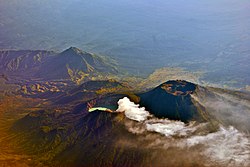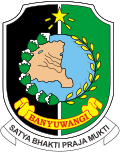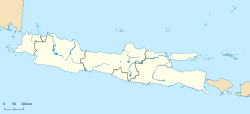Top Qs
Timeline
Chat
Perspective
Banyuwangi Regency
Regency in East Java, Indonesia From Wikipedia, the free encyclopedia
Remove ads
Banyuwangi Regency (Javanese: ꦏꦧꦸꦥꦠꦺꦤ꧀ꦧꦚꦸꦮꦔꦶ, Pegon: كابوڤاتَين باۑوواڠي, romanized: Kabupatèn Banyuwangi) is a regency of East Java province in Indonesia. This regency also known as the sun rise of Java because it is located at the easternmost end of Java Island. The town of Banyuwangi serves as a port for ferry services between Java and Bali. The regency is surrounded by mountains and forests to the west; by sea to the east and south - is separated by the Bali Strait from Bali. With an area of 3,594 km2, this regency is the third largest on the island of Java after Cianjur Regency and Sukabumi Regency in West Java. The regency is a tourist destination, and subject to ongoing development as an international tourist destination with relevant infrastructure.[2] Banyuwangi regency has been declared a taman bumi (earth park), or national geological park (Geopark) in 2018.[3]
It had a population of 1,488,791 according to the 2000 Census; by the 2010 Census it had risen to 1,556,078;[4] and at the 2020 Census to 1,708,114;[5] the official estimate as at mid 2024 was 1,791,789 (comprising 894,056 males and 897,733 females).[1] The town of Banyuwangi is the administrative capital. The name Banyuwangi is Javanese for "fragrant waters", connected to the Javanese folklore of Sri Tanjung.
Remove ads
Society and history
Summarize
Perspective

One Banyuwangi native group is the Osing community which has a Hindu culture although they can be considered as a Javanese sub-ethnic group. They live mainly in the central part of Banyuwangi and they sometimes consider themselves as Majapahit descendants. [citation needed] Other groups are Javanese (living mostly in the south and west), Madurese (mainly in the north, west, and coastal area) and Balinese (scattered but more concentrated in the east). Other smaller groups include Chinese, Buginese, and Arabs.
Once known as Blambangan Kingdom (or its variation: Balambangan and Balumbungan), it was a vassal of the Majapahit Kingdom and a regional trade centre. Blambangan's autonomy grew considerably after the end of 14th century AD. After the Majapahit Kingdom ceased to exist, it became an independent kingdom and, as such, the last Hindu kingdom of Java. In order to defend itself from the troops of the Demak Sultanate, which tried to occupy it, Blambangan asked for help from Balinese kings, which caused it to lose its independence to Balinese kingdoms. During this time Blambangan was deeply influenced by Balinese culture. After around 150 years of Balinese occupation, the Mataram Sultanate gained control of the territory and renamed it Banyuwangi. Tawangalun II of Blambangan freed Blambangan from Mataram sultanate during Trunajaya revolt and built the capital of Macan Putih, near modern day Banyuwangi. Later, it was part of the Mataram territory controlled by the VOC (1770). During the expansion of plantations in the 19th century, many parts of Banyuwangi were planted with coffee and sugar cane, which feature its landscape even now. The Chinese and Arabs came mostly during this period.
Banyuwangi people are known for their combination of Islamic and pre-Islamic tradition.
During the Fall of Suharto, a witchhunt in Banyuwangi (town) against alleged sorcerers spiraled into widespread riots and violence. In addition to alleged sorcerers, Islamic clerics were also targeted and killed, and Nahdlatul Ulama members were murdered by rioters.[6][7]
Remove ads
Culture
The Blambangan Peninsula is one of the remaining places in Java where Hindu culture is still retained, having a Balinese influence.
Gandrung Dance
This is a Banyuwangi-typical dance performed by a woman, accompanied with simple music from a violin, triangle (called kluncing), gong (or kempul), kendhang and sometimes keyboard as result of modern influence. It is performed during night until dawn, particularly in parties.
Janger or Damarwulan
Damarwulan is a legendary hero who features in traditional theatre art, which has been developed since the 19th century in Banyuwangi. It is a combination of Balinese, Javanese and local cultures. Balinese influences can be seen in its performers' costumes and instruments. Meanwhile, Javanese influences is in its "lakon" or stories as well as language in dialogues. It is distinct from the Balinese Janger dance.
Remove ads
Administrative districts
Summarize
Perspective

At the time of the 2010 census, Banyuwangi Regency was divided into twenty-four districts[8] (Indonesian: kecamatan), but an additional district - Blimbingsari - was subsequently created on 9 January 2017 from part of Rogojampi District. The twenty-five districts are listed below with their areas[9] and their populations at the 2020 Census[4] and the 2020 Census,[5] together with the official estimates as at mid 2024.[1] The table also includes the locations of the district administrative centres, the number of villages in each district (totaling 189 rural desa and 28 urban kelurahan), and its postal codes.
Note: (a) included 10 small offshore islands. (b) includes small offshore islands of Pulau Parengan and Pulau Watulayar.
(c) The 2010 population of the new Blimbingsari District is included in the figure for Rogojampi District from which it was cut out.
(d) including 2 urban kelurahan (Bakungan and Banjarsari). (e) includes small offshore islands of Pulau Boom and Pulau Santen.
(f) all 18 are kelurahan (Kampung Mandar, Kampung Melayu, Karangrejo, Kebalenan, Kepatihan, Kertosari, Lateng, Pakis, Panderejo, Penganjuran, Pengantigan, Singonegaran, Singotrunan, Sobo, Sumber Rejo, Taman Baru, Temenggungan and Tukang Kayu).
(g) comprises 4 kelurahan (Boyolangu, Giri, Mojopanggung and Penataban) and 2 desa. (h) comprises 4 kelurahan (Bulusan, Gombengsari, Kalipuro and Klatak) and 5 desa.
(i) includes small offshore island of Pulau Tabuan.
Remove ads
Transportation
Banyuwangi Airport at Blimbingsari serves the regency, Banyuwangi (town) city and surrounding area of East Java. Banyuwangi can be reached by road and rail from Surabaya or by ferry from Bali.
Tourism
Summarize
Perspective

Many European tourists visiting Bali come to Banyuwangi to surf in Plengkung and dive in Tabuhan Island. Ferries from Bali arrive at the port of Ketapang, some 8 km to the north of Banyuwangi city. Plekung Beach is also known as G-Land or green land have 3 types of waves up to 6 to 8 meters tall.[10]
- Banyuwangi International Surfing Competition 2014
This was the second time competition after the 2012 competition. 23–25 May 2014 competition is followed by at least 15 countries in Pantai Pulau Merah (Red Island Beach) which has 4 meters height and 400 meters long of waves.[11]
- Diamond Triangle
Diamond Triangle consists of:[12]
- Ijen Crater Nature Tourist Park, we can see tosca lake crater and traditional sulphur mining which the sulphur bunch mobilization still use human to hike and down to the crater.
- Alas Purwo National Park, besides see the animals we can surf at G-Land/Plengkung with Money Trees, Speddy's, Kongs, Twenty-twenty and Tiger Track waves.
- Meru Betiri National Park, Sukamade Turtle Breeding Station regularly releases baby marine turtles to open ocean. 4 of 6 kind of turtles can be found in Indonesia regularly visit Sukamade to put their eggs. Penyu Hijau (Green sea turtle) visit the Sukamade Beach almost everynight, Penyu Lekang (Olive ridley sea turtle) visit in March to June, Penyu Belimbing (Leatherback sea turtle) put the egg every 4 years in June to September and the scare Penyu Sisik (Eremochelys olivacea) very seldom to visit the beach.
- Waterfalls
There are a number of waterfalls in Kampung Anyar (New Village), near Kalibendo Plantation, around 15 kilometers from Banyuwangi on the way to Mount Ijen. There are three waterfalls near to each other known as the "Triple Waterfall" to be found 10 minutes walk down the stairs from a parking area. Or about 300 meters along the river, walking uphill, Kethagen Waterfall can be found. The cliff besides the river can reflect sunlight, glittering like diamonds.[13]
Remove ads
Climate
Summarize
Perspective
Banyuwangi has a temperate tropical and wet dry climate, similar to Banyuwangi's dry season start from May until October, and the rest is wet season. in 2013, Banyuwangi's highest average temperature is on October with 28.2 °C and lowest average temperature is on April with 24.8 °C
Remove ads
Environment
The forest and river in Banyuwangi is well-preserved, says the Indonesia Dragonfly Society because they found 3 dragonfly species which only can live in good environment.[18]
Nevertheless, there are local controversies in the Regency over the impact of gold mining activities in the locality of Tumpang Pitu village. In 2006, the Banywangi regency administration granted a mining licence to one company, PT Indo Multi Niaga, which later transferred the licence to another company. However, the local community had expressed concern about gold mining activities as early as 1997. The issues partly related to the protection of the area around a local Hindu temple, partly relate to environmental matters, and partly related to local community views about the economic and social impact of the mining.[19]
Remove ads
Gallery
- Ijen Crater
References
External links
Wikiwand - on
Seamless Wikipedia browsing. On steroids.
Remove ads







